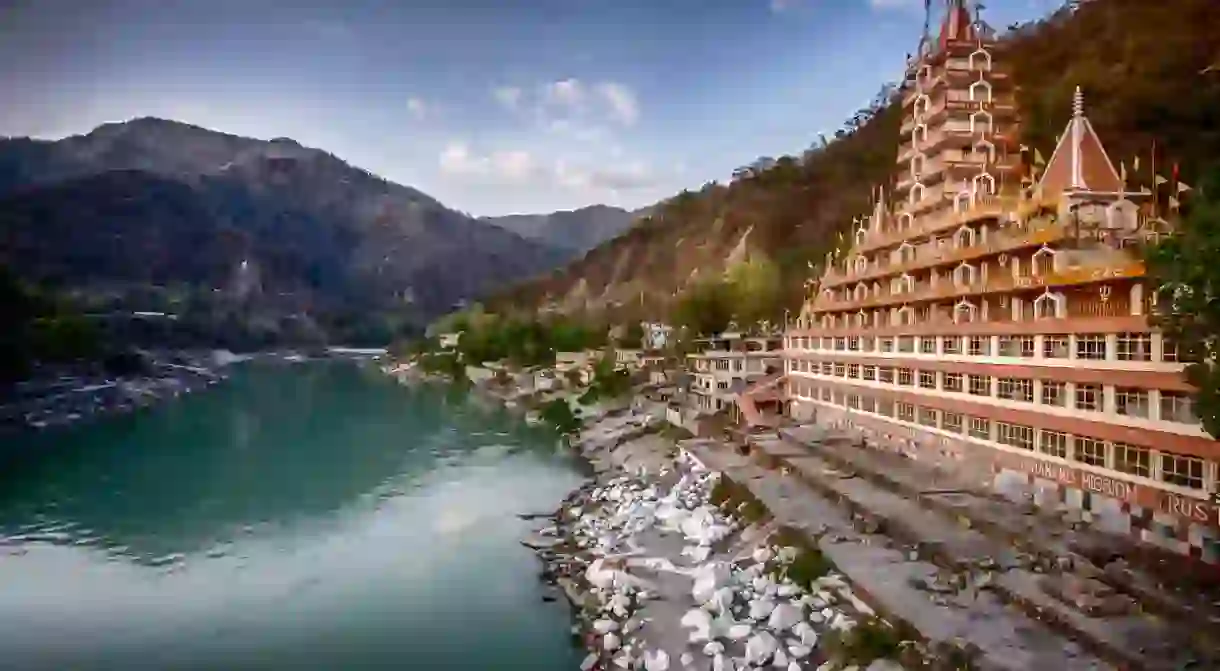Why Rishikesh, India is Dubbed the Yoga Capital of the World

India’s spiritually-enriched character has touched and transformed the lives of many around the world. And no matter which part of the country you’re in, there’s always a spiritual destination replete with yoga and meditation retreats closeby. However, if there is one destination that stands above the rest and truly reigns as the yoga and meditation capital of India, and indeed, the world, it’s Rishikesh.
Located at the foot of the mighty Himalayas along the banks of the Ganges River, Rishikesh has in many ways been the cradle of spirituality in India. This religious and historic town, which is also called Yoganagari, meaning the ‘City of Yoga’, has been home to innumerable saints, rishis and seekers over the years, the most famous being The Beatles, who visited Rishikesh on a soul-searching sojourn exactly 50 years back. And with yoga becoming a global phenomenon, Rishikesh is firmly in the spotlight once again as one of the best destinations to visit for the Indian art of yoga and spirituality.

The yoga capital of the world
Rishikesh is often referred to as the yoga and meditation capital of the world – and with good reason. Historically, the river banks and hills in the vicinity of the town were used by saints for yoga and meditation. Even today, there is no dearth of internationally-renowned yoga centres and ashrams here, and all you need to do to find yourself an ashram or yoga centre in Rishikesh is to turn a corner! The most internationally-acclaimed was the Chaurasi Kutia Ashram of Maharishi Mahesh Yogi, which once hosted famous celebrities such as Mia Farrow, Mike Lee, Mick Jagger, and of course, The Beatles. However, the ashram was left in disuse when the Maharishi shifted to Europe in the seventies, but efforts are on to renovate it to commemorate The Beatles’ visit.
There are, however, several major ashrams in Rishikesh today, the biggest of which is the Parmarth Niketan, which will host International Yoga Day this year. Ashrams in Rishikesh are known for their frugal facilities and lifestyle, which is conducive to the practice of yoga, although there are now several that even provide luxurious stay options. The growing importance and awareness of yoga, however, has meant that the ancient art has taken precedence over meditation and now attracts a large number of foreigners and locals interested in learning yoga right from the source.

The yogic way of life
Another major reason for Rishikesh’s renown as the yoga capital is its contrast with the overtly spiritual flavour of other destinations, such as Varanasi and Haridwar, which are more focused on Hindu religion and rituals. Rishikesh’s remoteness has further meant that common services aren’t readily available here, making it perfect for the yogic way of life, which involves cutting yourself off from the world to concentrate on the spiritual. Yoga and meditation are omnipresent in Rishikesh and not just in the ashrams. Filled with beautiful winding streams leading off of the Ganges and breathtaking natural splendour, every corner of Rishikesh makes a great makeshift yoga studio. Spirituality pervades almost all aspects of life in Rishikesh, with days usually starting and ending with meditation and yoga sessions. The town is also filled with numerous small temples where kirtan and bhajan sessions are conducted on a daily basis.
Environment and problems
While Rishikesh’s popularity among foreigners and yoga enthusiasts has created a boom for locals, over the years, the town has also become a mainstream tourist centre thanks to its natural beauty. With several new tourist resorts opening up, there has been an increase in activity in the region, which has adversely affected the town’s peaceful demeanour.
In particular, the sudden spurt of adventure sports and camping activities in the vicinity of the town have drawn strong protests from environmental activists. The once secluded banks of the Ganges in Rishikesh are now home to several tourist camps that organise rafting and other water sports in the rough waters here. This has also led to pollution of the river through solid waste and effluent dumping. However, international interest and pressure from activists have firmly put the spotlight back on yoga and there are efforts underway to reduce the environmental impact of adventure sports in the region to maintain its pristine nature. This will ensure that Rishikesh remains the yoga capital of the world.














